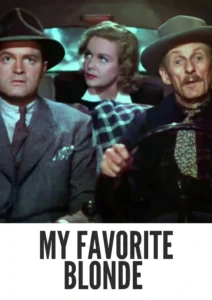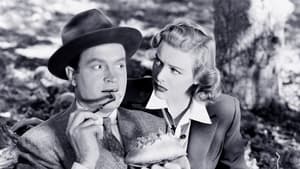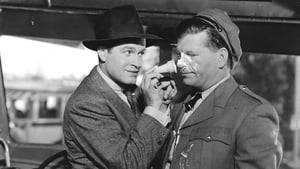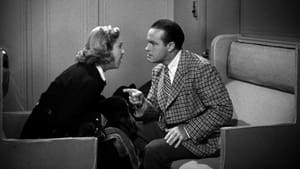Video Sources 0 Views

Download My Favorite Blonde (1942) Colorized HD | Bob Hope | Screwball Comedy Classic
Synopsis
Espionage, Showbiz, and Laughs: My Favorite Blonde (1942) in Vibrant Color

Step back in time with My Favorite Blonde, a delightful screwball comedy from 1942, now beautifully colorized to enhance your viewing experience. Starring Bob Hope and Madeleine Carroll, this film blends humor, romance, and espionage into a charmingly chaotic adventure. Perfect for fans of classic comedies and those looking for a lighthearted escape, this HD download brings a touch of golden-age Hollywood to your screen. Also known as “Bob Hope’s My Favorite Blonde,” this film remains a beloved classic.
My Favorite Blonde Storyline: A Whirlwind of Misadventures
My Favorite Blonde tells the story of Larry Haines (Bob Hope), a vaudeville performer mistaken for a spy. His life takes a hilarious turn when he encounters a beautiful British agent, Gail Richards (Madeleine Carroll), who is on a mission to deliver vital information to the United States.As Larry and Gail navigate a series of comical mishaps, they find themselves pursued by enemy agents who are determined to stop them. From runaway trains to mistaken identities, their journey is filled with slapstick humor and witty banter. Along the way, Larry’s comedic talents and Gail’s resourcefulness help them evade capture and ultimately complete their mission. My Favorite Blonde is a fast-paced and entertaining romp that showcases Bob Hope’s comedic genius and Madeleine Carroll’s charm.
Movie Cast
The film features a stellar cast of actors who bring this comedic caper to life:
- Bob Hope as Larry Haines
- Madeleine Carroll as Gail Richards
- Gale Sondergaard as Madame Runick
- George Zucco as Dr. Streger
- Una O’Connor as Mrs. O’Brien
Movie Genre
My Favorite Blonde is a screwball comedy, blending elements of romance, suspense, and slapstick humor. Its lighthearted tone and fast-paced plot make it a quintessential example of the genre.
Historical Context: Bob Hope and Wartime Entertainment
Released in 1942, My Favorite Blonde reflects the wartime era’s appetite for escapist entertainment. Bob Hope, already a popular radio personality, solidified his status as a comedic movie star with this film. During World War II, comedies like My Favorite Blonde played a crucial role in boosting morale and providing audiences with a much-needed dose of laughter.
Colorization Details
This colorized version of My Favorite Blonde has been meticulously restored using modern digital techniques, enhancing the visual appeal while preserving the film’s original charm. The colorization process involved carefully analyzing the grayscale tones of the original black and white footage and assigning appropriate colors to each scene. While the specific software used remains proprietary, the techniques employed included advanced algorithms for color palette selection and image enhancement. This painstaking process brings new life to the characters and settings, making the story even more engaging for modern audiences. While some may debate the merits of colorizing classic films, it introduces these films to a broader audience, ensuring their legacy for future generations.
Technical Details
- Director: Sidney Lanfield
- Screenplay: Melvin Frank, Norman Panama
- Story: Melvin Frank, Norman Panama
- Cinematography: Karl Struss
- Edited by: William Shea
- Production Company: Paramount Pictures
- Distributed by: Paramount Pictures
- Runtime: 78 minutes
Technical Specifications
- Download Format: MP4
- Resolution: HD (1080p)
- Compatibility: Compatible with most devices, including smartphones, tablets, computers, and smart TVs.
Reviews and Critical Reception
My Favorite Blonde (1942) is celebrated for its witty humor, fast-paced plot, and the comedic chemistry between Bob Hope and Madeleine Carroll. The film was a box office success upon its release and remains a beloved classic for its lighthearted entertainment value.
FAQs
- Q: What is My Favorite Blonde about?
- A: My Favorite Blonde is a screwball comedy about a vaudeville performer who gets mixed up in a spy mission with a beautiful British agent.
- Q: Is My Favorite Blonde (1942) a well-known Bob Hope film?
- A: Yes, My Favorite Blonde is one of Bob Hope’s popular films, known for its comedic elements.
- Q: Is this version of My Favorite Blonde colorized?
- A: Yes, this version has been professionally colorized to enhance the viewing experience.
- Q: What makes My Favorite Blonde interesting for classic film fans?
- A: My Favorite Blonde offers a glimpse into the golden age of Hollywood comedy.
- Q: What is the download format?
- A: The download format is MP4, which is compatible with most devices.
- Q: What resolution is the download?
- A: The resolution is HD (1080p), providing a high-quality viewing experience.
Download Now in HD!
Watch My Favorite Blonde Today!













